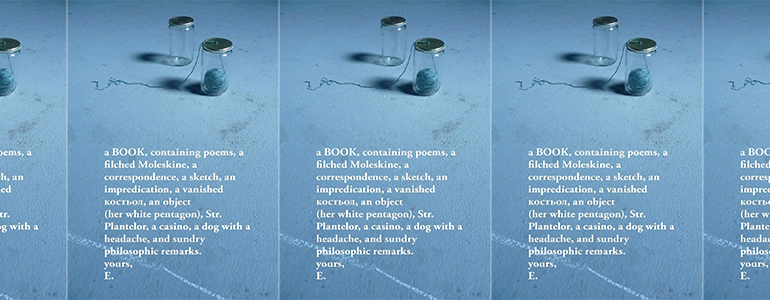The Unmemntioable’s Exploration of the Sublime

The opening poem of The Unmemntioable (2012) sets the scene of its author, Erín Moure, spreading her mother’s ashes in a village near the Davydivka River in what is now present-day Ukraine. It is a moment pregnant with memory and grief. Moure’s mother was born in western Ukraine in 1924 and was subject to the abject violence that took place there during World War II. Moure writes, “They burned those Polish houses, and drove them away”; “At night the children were harvested with flames. / The building spontaneously combusted.” Faced with the seemingly insurmountable task of depicting both this personal and historical tragedy, Moure displaces the act of writing The Unmemntioable onto her adopted pseudonym: “Perhaps it is better if Elisa Sampedrín writes of these things.” Thus Moure’s exploration of experience is defined not as a static object of knowledge, but as a necessary in-between movement, a deliberate violation of borders.
The word “tragedy” feels inadequate to describe these experiences. The sublime is often understood as that which is inexpressible—it exists as some essence that is beyond representation. In fact, any attempt to try to represent the sublime can be seen as an unethical transgression, because in its un-representability and un-reproducibility, the sublime takes on a kind of sacredness. It is therefore assumed that we have a moral obligation to keep the truth of the sublime intact by leaving it concealed, by sublimating it; anything less is tantamount to a lie. Much like the aleph, the first letter in the Hebrew alphabet that compresses all sacred inscription, this unrecognizable feeling of the sublime is unspeakable as a response—it collapses language to zero. This collapse of language in the presence of the sublime is indeed performed by the very title of Moure’s book, The Unmemntioable. The word “unmemntioable” is literally unmentionable, or at least it has no semantic meaning, even though a reader will no doubt automatically interpret the collapsed word into “unmentionable.”
In Monolingualism of the Other: or, The Prosthesis of Origin (1996), Jacques Derrida, translated by Patrick Mensah in 1998, writes, “I only have one language; it is not mine.” A native speaker of a language often assumes they possess a mastery over their given language, and in this way the language belongs to them. Possession of a language is bound together with ideas of a reader’s fluency, literacy, and an ability to interpret—to grasp the essence—of the semantic meaning of the text. In other words, the notion of language mastery is antithetical to the idea of the sublime. Language is a technology, a tool, but it does not belong to us (as a part of us) in any meaningful way—it is always outside of us. The Unmemntioable, like so many of Moure’s books of poetry, is not simply written in just one language. In fact, The Unmemntioable buries its reader under a deluge of so many different languages that they are likely to lose count of the actual number of them present in the book. The Unmemntioable is not a monolingual text—but then neither is it a multilingual text, since in Translingual Poetics: Writing Personhood Under Settler Colonialism (2018), the poet and scholar Sarah Dowling points out, “While the term multilingual is typically positioned as the alternative to monolingual, it is increasingly critiqued because it simply describes the coexistence of languages in space and time and is generally silent about the relationships between them.”
The Unmemntioable is thus a translingual text—it, in Dowling’s words, highlights “the capacity of languages to interact, influence, and transform one another.” The transformational quality of the many different languages contained in Moure’s poetry challenges English’s position as the language of power, the world’s privileged lingua franca, and its capacity as an explanatory medium. A reader’s experience of this book comes from the interaction, the necessary in-between movement of these languages as a deliberate violation of borders (both national-cultural borders and borders of sense-making). It would be incredibly difficult (maybe impossible) for a reader to be fluent in all of the different languages present in this book of poetry. A reader therefore becomes blind in a sense due to the proliferation of semantic meaning. Moure’s translingual poetics understands the sublime as affecting a kind of paralysis, or what the cultural theorist, literary critic, and feminist scholar Sianne Ngai calls “stuplimity.” In her essay, “Stuplimity: Shock and Boredom in Twentieth-Century Aesthetics” (2000), she writes that stuplimity is difference that is stupefying—it obstructs response and produces an unqualified, unrecognizable feeling. In Ngai’s words, “[it] confront[s] us with the limitations for our capacity for responding in general.”
It is clear that in The Unmemntioable, language is related to ideologies of identity and place. Moure, for instance, calls home “the barbaric language.” Language creates a sense of community and belonging, but it is also a form of exclusion: “The word that can be lost and burned. / The word that cannot <shibboleth>.” Shibboleth, coming from the mid-seventeenth century Hebrew, is a custom, principle, or belief distinguishing a particular class or group of people, especially a long-standing one regarded as outmoded or no longer important. “In the fields where people were once murdered on the basis of an accent. By asking locals the names for food, pyrohy or pirogy, they knew which language led at home, which is to say at the table.” In the place Moure’s mother grew up, language was a kind of test to see which community one belonged to, and it could also get you killed: “In those years, a name was an enemy, an accent in a word was an enemy, an alphabetic spire of ink in a ledger was an enemy.” To lose a language is to lose a home and a national identity. Moure recounts something her mother would say to her: “I come from nowhere, she’d say to the small E.M. / Some people come from nowhere.” In a lot of ways, The Unmemntioable is itself a kind of shibboleth, a test of pronunciation or readability designed to separate groups into those who understand tragedy and those who understand that “tragedy” is insufficient.
When we wield language as a tool, unaware of its autonomy—Derrida would say the constant slippage between a word’s signifier and signified, its sign and its referent—it becomes insufficient for saying the unsayable. Throughout The Unmemntioable, Moure includes multiple quotes from the poet Paul Celan. Celan, in his attempt to write about the unspeakable horrors of the Holocaust, found the German language to be insufficient for his poetry after it had been appropriated and degraded by the Nazi regime. Celan might also be the impulse behind Moure’s attempt to collapse language to zero. She writes, “i sew the alphabet shut too / a to b, facing / ab to cd, facing / o to a, facing / i to u, o, un / faced / e / the unmemntioable.” Moure sews language shut so that it cannot speak anymore. In much the same way, she performs a kind of poetic erasure that calls attention to a nothingness. This nothingness is “a forbidden surface <unmemntioable> / [a vowel in ttrout].” A little later in the text, Moure references vowels again: “s_rr_w too / harvested of v_wels / f_r tr_ut.” The missing vowel is “o,” which also happens to resemble a zero. Moure calls the reader’s attention to the presence of nothingness as a forbidden surface by highlighting the fact that these o’s are erased—the space within each word where this vowel should appear is demarcated by an underscore, and so its absence is marked. Language has not yet collapsed around this nothingness, but rather leaves it intact.
And yet, despite all of this attention to nothingness, the literary critic Shirley McDonald points out in her essay “Finding Common Ground: Purposeful Disarticulation in the Poetry of Erin Moure” (2015) that language always necessarily points somewhere: “There are recognizable signifiers, however, that operate as a pattern of ever-widening circles of expansion, a movement marked by the poet’s shifting subjectivity as she evolves from her self-inscription as a daughter to a lover to a national citizen to a philosopher exploring the world within its earthly grounding, adopting, as does Moure, Heideggerian images of the sublime.” This earthly grounding serves as a counterpoint to nothingness. Moure writes, “Experience appears in this world as a birth. A birth which takes as assistants sky and earth and the water and wood and mountains and the clouds. Experience does not come out of the mind or imagination but from a deep and irrecusable need. It rents the entire person.” It seems significant that experience takes its assistants in the forms of sky and earth and water and wood and mountains and clouds—experience comes to us through our inhabiting the world. It is bodily, sensual, relational. It is not located in the mind through cognition or imagination.
Similarly for Heidegger, the poetic is a measurement of experience, and it is not based in fantasy—it is that thing that grounds us on this earth. In his essay “‘…Poetically Man Dwells…’”, translated by Albert Hofstadter in Poetry, Language, Thought (1971), Heidegger writes, “Poetry does not fly above and surmount the earth in order to escape it and hover over it. Poetry is what first brings man onto the earth, making him belong to it, and thus brings him into dwelling.” If death is one boundary of the sublime—the zero, the nothingness—then the other is birth—the coming into dwelling of experience. Both mothers and languages are origin points that give birth to subjectivity. The boundaries between mother and child are often inextricable during the child’s development in the womb. A child is never conscious of these moments, and it is only after a mother gives birth that a child’s subjectivity begins to develop. In Moure’s words: “A mother is the unmemntioable boundary / that can never come fully clear.” The moment before individual subjectivity comes into existence, fully clear, is a moment of the unspeakable sublime.
Moure’s poetry seems especially prescient and takes on a more pronounced biopolitical valence in our current moment, situated as it is between another ongoing genocide in Ukraine and an impending decision from the Supreme Court of the United States to repeal Roe v. Wade and Planned Parenthood of Southeastern Pennsylvania v. Casey, possibly forcing millions of people to carry pregnancies and give birth against their will. These are examples of the way the State (national political power) claims absolute, sovereign power in order to manage and control not just individual bodies but whole populations. In a series of lectures titled Society Must Be Defended, Michel Foucault refers to this as sovereignty’s “power to ‘make’ live and ‘let’ die.” Embodied experience, like poetry, always exists in excess of the language used to communicate it. State power attempts to articulate and negotiate these boundaries of the sublime for us. Those boundaries, however, are inarticulate, unspeakable. We should be all the more vigilant about how State-sanctioned violence through this negotiation of boundaries can likewise be unspeakable.
This piece was originally published on May 16, 2022.



